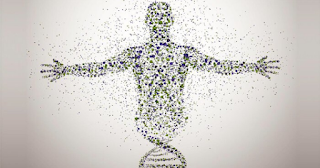The history of epigenetics is intertwined with the study of evolution and development.
The term ‘epigenetics’ has been around for centuries and was originally used to describe the processes by which a fertilized zygote developed into a mature organism. The word has evolved to mean any process that alters gene activity without actually changing the original DNA sequence. Gene modifications are then passed on to newly birthed ‘daughter cells’ and can be inherited by offspring.
It used to be believed that an embryo’s epigenome, the record of chemical and DNA alterations, was completely erased and rebuilt from scratch. But this was determined not to be entirely true. Some epigenetic tags remain in place as genetic information passes from generation to generation, a process called epigenetic inheritance.
Epigenetic inheritance adds another dimension to the modern picture of evolution. It goes against the idea that inheritance happens only through the DNA code that passes from parent to offspring. It means that a parent’s experiences, in the form of epigenetic tags, can be passed down to future generations.
The human genome changes slowly, through the processes of random mutation and natural selection. It takes many generations for a genetic trait to become common in a population. However, the epigenome can change rapidly in response to the environment.
How Trauma is Inherited
Science is showing that the impact of traumatic experiences can be epigenetically inherited via ‘molecular memory’ passed down through generations. The Discover Magazine article, Grandma’s Experiences Leave a Mark on Your Genes, explains how this trauma can be passed down:
According to the new insights of behavioral epigenetics, traumatic experiences in our past, or in our recent ancestors’ past, leave molecular scars adhering to our DNA. Jews whose great-grandparents were chased from their Russian shtetls; Chinese whose grandparents lived through the ravages of the Cultural Revolution; young immigrants from Africa whose parents survived massacres; adults of every ethnicity who grew up with alcoholic or abusive parents—all carry with them more than just memories.Like silt deposited on the cogs of a finely tuned machine after the seawater of a tsunami recedes, our experiences, and those of our forebears, are never gone, even if they have been forgotten. They become a part of us, a molecular residue holding fast to our genetic scaffolding. The DNA remains the same, but psychological and behavioral tendencies are inherited. You might have inherited not just your grandmother’s knobby knees, but also her predisposition toward depression caused by the neglect she suffered as a newborn.
What Epigenetics Means for Your Mental Health
The likelihood of developing behavioral and psychiatric disorders later in life is increased by trauma. The detrimental effects of traumatic events show up in the children of those impacted, despite these individuals having never experienced it themselves. This inherited ‘molecular memory’ can be detected in the child’s epigenome.
Many studies have confirmed that people with a certain gene combination are more affected by stress and trauma in life which leads to a genetic susceptibility, for example, for depression, behavioral problems, or violence. These people have brains which react more strongly to feelings of danger making them more vulnerable when things go wrong. However, some individuals, with a different gene combination, seem to sail through life’s adversities with very few negative consequences.
One gene, a serotonin transporter gene, has been widely studied regarding epigenetic inheritance and mental health and has been linked to depression, anxiety, OCD, PTSD, autism addiction, and other mental disorders. In her book Rainy Brain, Sunny Brain: How to Retrain Your Brain to Overcome Pessimism and Achieve a More Positive Outlook, Elaine Fox explains:
So, rather than the serotonin transporter being a vulnerability gene or an optimism gene, if it is a gene for anything, it is likely to be a ‘plasticity’ gene: those with a low expression form are simply more open and reactive to their environment and therefore will benefit from great facilities and support but will also be more severely affected by abuse and lack of support.…What happens to us at even a very young age can have long lasting effects. These influences are the effects of the environment, yes, but they are the effects of the environment working through our genes.
Epigenetic Changes Can Be Reversed
The good news is that the changes in the brain can be reversed. Medications, hypnosis, neuro-linguistic programming, neurofeedback, cognitive behavioral therapy, eye movement desensitization and reprocessing (EMDR), and other brain-related modalities—even virtual reality, ketamine, and methylenedioxymethamphetamine (ecstasy)—have proven helpful in treating trauma.
Research has demonstrated that the epigenetic effects of trauma can be reversed so that they are not passed down. Specifically, the reversal of traumatic symptoms was observed in male mice and their offspring as the result of environmental enrichment. The elimination of symptoms was linked to the epigenetic regulation of the glucocorticoid receptor gene. An enriched environment for a human would include:
1. Healthy Diet: Eat more nutritious foods and limit processed and junk food. What you put in your mouth has everything to do with what goes on in your head.
2. Physical Activity: Move your body. After sleep, exercise is the best thing you can do for your brain.
3. Challenge: Regularly push your brain out of its comfort zone.
4. Novelty: Enrich and grow your brain by exposing it to new things daily.
5. Laughter: Be playful and have fun. Your brain loves to laugh and it’s good for it.
6. Connection: Maintain intimate, close-knit human bonds. Your brain needs to be connected to others. https://upliftconnect.com/heal-your-brain-by-reversing-generational-trauma/?utm_source=UPLIFT&utm_campaign=908684c092-EMAIL_CAMPAIGN_2018_04_12&utm_medium=email&utm_term=0_19c1fc07c2-908684c092-112953829






Комментариев нет:
Отправить комментарий